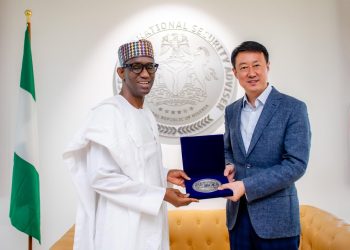China’s new energy vehicle (NEV) supply chain actively seeks enhanced cooperation with global partners despite the recent rise in regulatory scrutiny in Chinese electric vehicles, according to companies at a major Chinese expo focusing on supply chains.
“We always maintain an open and cooperative attitude, working hand in hand with global partners to jointly explore broad market prospects,” said Victor Yang, senior vice president of major Chinese automaker Zhejiang Geely Holding Group, at the ongoing China International Supply Chain Expo (CISCE) in Beijing.
The CISCE is the world’s first national-level supply chain expo. Addressing the opening ceremony of the event, Chinese Premier Li Qiang called for enhanced global cooperation on industrial and supply chains.
China is the world’s largest NEV market. However, its NEV sector came under increasing regulatory scrutiny recently as the EU launched an anti-subsidy probe into Chinese electric vehicles in October. China Association of Automobile Manufacturers called the probe “an apparent act of protectionism.”
Despite this, NEV makers and relevant suppliers at the CISCE keep positive prospects in collaborating with global partners and working for win-win solutions.
Ningbo Shanshan Co., Ltd., a Chinese manufacturer of lithium battery materials, announced plans in September to invest up to 1.28 billion euros (about 1.4 billion U.S. dollars) in building a new plant in Finland. It is the company’s first overseas project.
Zheng Ju, chairman of the company, said the company will be firmly rooted in the Chinese market while expanding its presence globally to integrate deeply into the global intelligent automotive industry.
“We are committed to openness and cooperation to work with global partners to make innovative breakthroughs and develop next-generation technologies together,” Zheng added.
Shenzhen Colibri Technologies Co., Ltd., a supplier of automation and testing equipment for battery module pack assembly, has branches in Thailand, Singapore, and many other nations.
Since its establishment in 2001, the company has focused on global expansion, said Gang Wei, head of its marketing center. In 2022, revenue from its export business accounts for around one-fifth of the company’s total.
“We have a completely open attitude towards international cooperation and welcome more foreign enterprises to cooperate with us,” Gang said.
Zhang Shaogang, vice chairman of China Council for the Promotion of International Trade, highlighted that China’s automotive industry has a complete industry chain foundation from the demand side to the supply side, with remarkable advantages in areas such as the new energy battery technology and level of intelligence.
“This has propelled China’s market transformation from a major consumer of automobiles to a major collaborator in automotive technology,” Zhang said. “It has brought new opportunities for the global automotive industry development and sustained economic growth.”
At the expo, long-term partners within the Chinese automotive supply chain expressed substantial benefits from collaborating with their Chinese supply chain partners.
Chen Yudong, president of Bosch China, said Bosch has greatly benefited from the growth rate and development quality of the Chinese automotive industry.
“After a decade of cultivation, China’s NEV development has brought many advantages to our local supply chain,” he said. “As a part of the Chinese supply chain, Bosch has also benefited from such a transformation, upgrade, and vibrant development.”
Song Gang, manufacturing vice president of Tesla Inc, said the company started working with many Chinese enterprises over a decade ago, and the cooperation further deepened in 2019 after Tesla’s Shanghai Gigafactory broke ground.
“Tesla’s success in China is, to a larger extent, the success of our Chinese supply chain,” Song said. “Tesla will continue to deepen its presence in China, consistently strengthen its investments, and build an efficient and high-quality supply chain.”













































